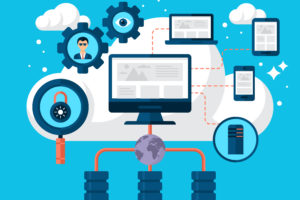Picture this: you open up your business for the day. Then you discover that all of your data is gone. Phone records, invoices, addresses, and even customer names have vanished from all of your computers.
Sure, you might be able to regain some of the information from the contacts stored in your phone. Maybe you have paper records lying around — but those are likely hard to cross-reference, and are probably filed poorly.
If you’re like most businesses, losing all of your data would cause your day-to-day operations to grind to a halt. At the very least, sales would close much more slowly over the next couple days.
This situation sounds like a farfetched nightmare. Yet, for many small businesses without plans to store and protect their data, it’s a possibility.
Read on to discover the differences between data loss and data leakage, and what you can do to prevent each.
Data Loss
Data loss refers to two separate events.
The first is that your data is simply lost — it can be retrieved. The second is that your data has been stolen through cyberattacks, ransomware, or hackers.
In the first case, common causes of data loss include not backing up your data, putting pertinent files on a physical hard-drive and misplacing it, and computer failure.
To prevent the complete loss of your data, your pertinent information should always be stored on the cloud, and not on employee computers. You should have strict rules about what data can be taken out of the office.
For the second case, you should keep your system updated, install a strong antivirus, and never leave your computer unsecured. There are many simple steps you can guard your computer from internal and external attacks.
Data Leakage
Data leakage, on the other hand, may happen without losing information — and not as a result from any malicious intent.
Many small businesses rely on applications like ADP, PeopleSoft, Oracle, or a WMS to handle their business’s information. In order to work for your business, these software programs have to store sensitive information, like employee records, stock levels, pricing predictions, and more.
While these programs are secure in and of themselves, data can leak out in other ways.
For example, analytics, reporting, unrestricted access, and more can expose more people to the sensitive information. And when more people are exposed to it, they can make copies of it, sell it, or steal it.
So, how do you prevent data leaks from happening? The first step is identifying what data on these applications is sensitive. The next step is ensuring that the sensitive data is only exposed to employees on a “need to know” basis.
Some common ways to ensure that data doesn’t leak include requiring new employees to be authorized before given access, having key parties sign legal waivers, and having your IT department check for any anomalous activities in these data centers.
Instituting new data leakage controls may seem like a hassle, but it’s worth it to protect your information.
Need help safeguarding your data? Vodigy Networks helps businesses in the Midwest make the most of technology. Contact us today!




